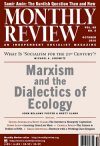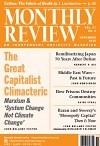Middle East

On August 29, in a historic moment in the history of the planet, the 35-member Anthropocene Working Group (AWG) reported to the International Geological Congress that the Anthropocene epoch in geological history is “stratigraphically real” and should be dated as arising around 1950, displacing the Holocene epoch of the last 12,000 years. The AWG has yet to arrive at a formal decision that would adopt a definite global “signal” (though ten of the thirty-five members currently support using fallout radionuclides from atomic weapons testing as the signal), which would be followed by the designation of a “golden spike” or actual location in the rock, sediment, or ice strata. Yet the general parameters of the onset of the new epoch are clear.… As Colin Waters, secretary of the AWG, explained: “Being able to pinpoint an interval of time is saying something about how we have had an incredible impact on the environment of our planet. The concept of the Anthropocene manages to pull all these ideas of environmental change together.” Most importantly, it tells us that the world economy has generated an anthropogenic rift in the Earth system threatening millions of species, including our own, requiring fundamental changes in the way in which society relates to the earth through production. | more…
The political chaos that has recently dominated the scene in the Middle East is expressed, among other ways, by the violent resurgence of the Kurdish question. How can we analyze, in these new conditions, the scope of the claims of the Kurds—autonomy, independence, unity? And can we deduce from analysis that this claim must be supported by all democratic and progressive forces, in the region and in the world?… Debates on the subject produce great confusion. This is because most contemporary actors and observers rally around a non-historical vision of this and related issues.… I will offer a counterpoint to this transhistorical vision of social issues and “rights,” through which the social movements of the past and present express their demands. In particular, I will attribute paramount importance to the divide that separates the thriving of the modern capitalist world from past worlds. | more…
Ali Kadri, Arab Development Denied (London: Anthem, 2014), 250 pages, $40, paperback.
Perhaps nowhere does violence collapse the horizon as it does in the Arab world. Imperial wars have demolished the Libyan state and turned Syria into a charnel house. Yemen, the region’s poorest country, was a U.S. drone shooting gallery before Saudi Arabia…attacked it, sending it spiraling into famine. Iraq shudders under ISIS’s car bombs after decades of wars and sanctions. And Palestine continues to bleed and resist under the weight of Israeli settler-colonialism.… Why so much violence? The academic mercenaries of counterinsurgency studies fixate on terrorism as a response to material grievance, and Western war as the response. Others ascribe the region’s underdevelopment to a mix of institutional inadequacy and democratic deficits, remediable by the application of U.S. power.… Against this tableau, Ali Kadri in Arab Development Denied offers a coruscatingly intelligent account of how the United States has denied Arab development. Through wars, colonialism, and sanctions, it has sought for decades to prevent working-class sovereignty in the region. | more…
Marx’s Capital presents a rigorous scientific analysis of the capitalist mode of production and capitalist society, and how they differ from earlier forms. Volume 1 delves into the heart of the problem. It directly clarifies the meaning of the generalization of commodity exchanges between private property owners (and this characteristic is unique to the modern world of capitalism, even if commodity exchanges had existed earlier), specifically the emergence and dominance of value and abstract social labor.… Volume 2 demonstrates why and how capital accumulation functions, more specifically, why and how accumulation successfully integrates the exploitation of labor in its reproduction and overcomes the effects of the social contradiction that it represents.… Volume 3 of Capital is different. Here Marx moves from the analysis of capitalism in its fundamental aspects (its “ideal average”) to that of the historical reality of capitalism.… To move from the reading of Capital (and particularly of volumes 1 and 2) to that of historical capitalisms at successive moments of their deployment has its own requirements, even beyond reading all of Marx and Engels. | more…
Longtime
Monthly Review and Monthly Review Press author Richard Levins died on January 19, 2016, at the age of eighty-five. A polymath, he studied agriculture, mathematics, genetics, evolution, ecology, and philosophy.… He collaborated with Cuban scientists and served as a scientific advisor for Cuba. With his close friend and coauthor Richard Lewontin he wrote a column, “Eppur´ Si Muove,” for the journal
Capitalism, Nature, Socialism, and he actively participated in the progressive organization Science for the People, working to confront the misuse of science. He was, above all, a leading Marxist intellectual, ecologist, biomathematician, philosopher of science, and comrade.… Four months before his death, Levins submitted this essay to
Monthly Review. In it he discusses
La economía del conocimiento y el socialismo by Agustín Lage, published in 2013 by Editorial Academia del Hispanismo. The book is currently unavailable in English translation. In the pages that follow, we feature this last essay by Levins, under the circumstances substantially unedited, along with his classic article “Living the Eleventh Thesis,” an excerpt from
Biology Under the Influence that first appeared in the January 2008 issue of
Monthly Review.
—Brett Clark

According to renowned Marxist economist Samir Amin, the recent Arab Spring uprisings comprise an integral part of a massive “second awakening” of the Global South. From the self-immolation in December 2010 of a Tunisian street vendor, to the consequent outcries in Cairo’s Tahrir Square against poverty and corruption, to the ongoing upheavals across the Middle East and Northern Africa, the Arab world is shaping what may become of Western imperialism—an already tottering and overextended system.
The Reawakening of the Arab World—an updated and expanded version of Amin’s The People’s Spring, first published in 2012 by Pambazuka Press—examines the complex interplay of nations regarding the Arab Spring and its continuing, turbulent seasons. Beginning with Amin’s compelling interpretation of the 2011 popular Arab explosions, the book is comprised of five chapters—including a new chapter analyzing U.S. geo-strategy. Samir Amin sees the United States, in an increasingly multi-polar world, as a victim of overreach, caught in its own web of attempts to contain the challenge of China, while confronting the staying power of nations such as Syria and Iran. The growing, deeply-felt need of the Arab people for independent, popular democracy is the cause of their awakening, says Amin. It this awakening to democracy that the United States fears most, since real self-government by independent nations would necessarily mean the end of U.S. empire, and the economic liberalism that has kept it in place. The way forward for the Arab world, Amin argues, is to take on, not just Western imperialism, but also capitalism itself. | more…
Rula Jurdi Abisaab and Malek Abisaab, The Shi’ites of Lebanon: Modernism, Communism, and Hizbullah’s Islamists (Syracuse, NY: Syracuse University Press, 2014), 350 pages, $49.95, hardcover.
In the West today, political Islam is mostly equated with ISIS’s spectacle of violence, and with the narrow, bigoted understanding of religion and society that inspires it. It will thus intrigue many readers to discover that the legacy of Islamic intellectual and political activity, from the turn of the twentieth century until today, bore the imprint of a complex interaction between Communist and leftist traditions. A recent book by two professors at McGill University, Rula Jurdi Abisaab and Malek Abisaab, takes on the ambitious task of tracing the history of the sometimes symbiotic, sometimes confrontational relationship among Shi’i communities and clerics in Lebanon, along with occasional discussions of related issues in Iraqi politics. Based on a rich set of primary documents from both countries, the authors describe in great detail the rise and fall of the Communist experience in the region, the shortcomings of the left as it was gradually superseded by Islamic party formations, and the deep debt of the latter to the former. | more…

To understand why the Middle East is now in shambles, with the United States currently involved simultaneously in wars against both the Assad government in Syria and the Islamic State in Iraq, generating the greatest refugee crisis in Europe since the Second World War, it is necessary to go back almost a quarter-century to the 1991 Persian Gulf War. The Gulf War, unleashed by the United States in response to Iraq’s invasion of Kuwait, was made possible by the growing disorder in the USSR followed by its demise later that same year. The USSR’s disappearance from the world stage allowed the United States to shift to a naked imperialist stance—though justified in the manner of the colonial empires of old as “anti-terrorism” and “humanitarian intervention”—not only in the Middle East, but also along the entire great arc that had constituted the perimeter of the former Soviet Union. | more…
With the collapse of the Soviet Union and the end of the Cold War, elements within the U.S. ruling class came to believe that their country was militarily invincible. Indeed, they believed this newfound military superiority over any potential rival was something new in human history. So great was its technological advantage, the United States could destroy its enemies with complete impunity. A long-heralded Revolution in Military Affairs was taking place, enabling the United States to reshape the world. New smart technologies would disperse the “fog of war,” making it possible for the United States to kill its enemies without their being able to strike back, and the “Vietnam syndrome” could be overcome once and for all.… Even so, at this point in time, the U.S. government proceeded with considerable caution. The then-secretary of defense, Dick Cheney no less, made clear that the United States did not invade and occupy Iraq at this time because of the danger of finding itself in a “quagmire” where it would be taking casualties while the Kurds, the Shia, and the Sunnis fought it out. The administration decided not to involve itself in “that civil war.” Such a commitment would have had to involve the use of “overwhelming force” for an extended period if it was to have any chance of success. This was in 1991. Ten years later such caution had been replaced by an overweening self-confidence, by a belief that the United States could completely reshape the Middle East, starting with Iraq, and then moving on to Syria and Iran. And, moreover, this could all be achieved with a comparatively small invading and occupying army. | more…
Lenin, Bukharin, Stalin, and Trotsky in Russia, as well as Mao, Zhou Enlai, and Den Xiaoping in China, shaped the history of the two great revolutions of the twentieth century. As leaders of revolutionary communist parties and then later as leaders of revolutionary states, they were confronted with the problems faced by a triumphant revolution in countries of peripheral capitalism and forced to “revise”…the theses inherited from the historical Marxism of the Second International.… With the benefit of hindsight, I will indicate here the limitations of their analyses. Lenin and Bukharin considered imperialism to be a new stage (“the highest”) of capitalism associated with the development of monopolies. I question this thesis and contend that historical capitalism has always been imperialist, in the sense that it has led to a polarization between centers and peripheries since its origin (the sixteenth century), which has only increased over the course of its later globalized development. | more…
When international media were broadcasting live video footage of Tunisians gathering in hundreds of thousands in front of the central office in Tunis of the long-terrifying ministry of home security, chanting in one voice “the people want to bring down the regime,” something had already changed: ordinary people realized they could make huge changes. Weeks later, the Egyptian uprising removed the Mubarak regime that had been entrenched in power for over thirty years…. The neoliberal forms of imperial rule that had destroyed the hopes of the liberation movements were under attack. In order to counter the possibilities for a massive breakthrough at the popular level, the Western forces mounted an invasion of Libya using the mantra of humanitarianism to disrupt, militarily, political and economic life in Africa. Later in collusion with the counter-revolutionary forces in the Egyptian military, Western imperialism sought to roll back the gains of people in the streets of Tunis and Cairo. | more…
Turkey’s ruling party has turned the country, which it calls “the new Turkey,” into a capitalist nightmare: a triad of neoliberal economics, political despotism, and Islamist conservatism. This article provides an overview of neoliberalism in Turkey, then looks at the government’s extraction policies, highlighting the Soma mine massacre as one tragic example of the destructive policies of the governing party, the Adalet ve Kalkınma Partisi (AKP, Justice and Development Party). It also examines the extreme authoritarianism of President Recep Tayyip Erdoğan (formerly prime minister), and the growing cultural-relgious conservatism, which the AKP has interlaced with Islamist rhetoric. This hegemonic triad of neoliberalism, despotism, and conservatism is an especially dangerous one. However, it is being increasingly criticized, and resistance movements against neoliberal policies are growing. All of this gives some hope for Turkey’s future. | more…


